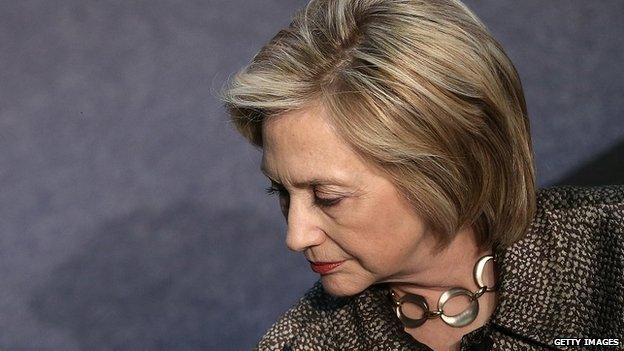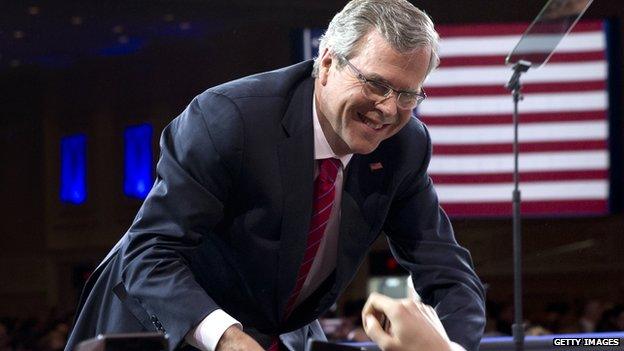Clinton cash questions over Russian deal
- Published

On Thursday the New York Times, external and the Washington Post, external both published articles digging deep into the Clinton family finances involving the Clinton Foundation - and the possible conflicts of interest they have created.
In the Times Jo Becker and Mike McIntire write about a Russian energy conglomerate's purchase of a Canadian company with uranium mining interests in the US and Kazakhstan. It's a detailed, 4,000-word investigation with a lot of moving parts, but the gist is clear.
The chairman of the Canadian company that profited from the sale, Ian Telfer, donated millions of dollars to the Clinton Foundation, the charitable organisation set up after Bill Clinton left the presidency - most of which was not reported publicly. The founder of the company, Frank Giustra, also donated $31m (£20.5m) to the foundation and flew Mr Clinton to Kazakhstan in 2005, at a time when the nation was considering whether to grant uranium mining rights to Canadian company.
In 2010, at roughly the same time, the Russian company, Rosatom, was attempting to purchase the Canadian company, Mr Clinton travelled to Moscow and was paid $500,000 by a bank affiliated with Rosatom.

The US government, including the Department of State then headed by Democratic presidential candidate Hillary Clinton, had to approve the Russian purchase, as it involved acquiring strategic mineral rights on US soil. It did.
"Whether the donations played any role in the approval of the uranium deal is unknown," Becker and McIntire write. "But the episode underscores the special ethical challenges presented by the Clinton Foundation, headed by a former president who relied heavily on foreign cash to accumulate $250m in assets even as his wife helped steer American foreign policy as secretary of state, presiding over decisions with the potential to benefit the foundation's donors."
Those "special ethical challenges" were scrutinised in the Post piece, as well, which reveals more details about the vast sums of money in speaking fees Mr Clinton has amassed since his presidency ended in 2001.
Mr Clinton was paid "more than $100m for speeches between 2001 and 2013", the Post notes, including "at least" $26m by groups that also donated to the Clinton Foundation, such as financial firms often considered villains on the populist left, like Goldman Sachs and CitiGroup.

Bill Clinton received $26m in speaking fees from groups that also donated to the Clinton Foundation
"The multiple avenues through which the Clintons and their causes have accepted financial support have provided a variety of ways for wealthy interests in the United States and abroad to build friendly relations with a potential future president," writes the Post's Rosalind S Helderman.
Meanwhile Reuters is reporting that the Clinton Foundation will refile "at least five" of its past tax returns to correct errors involving unreported or over-reported of millions of dollars donations from governments.
These stories come on the heels of a Sunday article in the New York Times detailing the growing buzz surrounding an upcoming book about the Clinton Foundation finances, Clinton Cash, by conservative scholar Peter Schweizer.
The work, according to reports, will contain numerous examples of donations to the foundation or speaking fees given to Mr Clinton followed by US government actions that were beneficial to the donating parties.
It appears the book will not contain concrete evidence of actions taken by Mrs Clinton in exchange for donations - but concerns over an appearance of impropriety are stoking interest by media outlets and attacks from Mrs Clinton's political adversaries.
The Times story also reveals that Mr Schweizer's publisher, HarperCollins, has provided advanced copies of the book to both the Post and the Times, which are relying on its research in their own investigations.
In Thursday's article the Times authors state that "some of the connections" between the Canadian energy company and the Clinton Foundation were "unearthed" by Schweizer and that the paper has "scrutinised his information and built upon it with its own reporting".
According to the Post's Helderman, Schweizer's work did not contribute to her story, which "is based on reporting and documents collected independently".
Bloomberg's Leonid Bershidsy writes, external that the most disturbing element to these stories is attempts by the Clintons to keep some of the donations secret. At the time Rosatom's purchase of US uranium interests wasn't considered a significant deal - the Wyoming mine in question was barely producing any nuclear material and its uses are solely commercial, not military.
"One can only guess at the reasons the contributions, totaling millions of dollars, were kept quiet, but perhaps the idea was to avoid precisely the kind of story the New York Times produced, hinting at a Clinton family interest in helping a businessman friend," he writes.
Mrs Clinton "was clearly worried about the optics of some of the things she and her husband were doing and tried to keep them out of the public eye," he continues. "As is usual in such cases, the cover-up drew her more unwanted attention than her actions warranted."

Presidential hopeful Jeb Bush will have his finances scrutinised in an upcoming book
Brian Fallon, a spokesperson for the Clinton campaign, tells the Times the suggestions of impropriety were "baseless".
There is not a shred of evidence "supporting the theory that Hillary Clinton ever took action as secretary of state to support the interests of donors to the Clinton Foundation", he adds.
Clinton Cash is set to be released on 5 May, and this is almost certainly not the last of both the Post's and the Times's investigations into Clinton finances. Expect more stories that focus on the appearance and possibilities of conflicts of interest - but with no firm evidence of quid pro quos, such as Mrs Clinton's direct or unexpected involvement in altering US policy.
Fox News, another outlet granted access to Schweizer's research, is planning an hour-long report on Friday titled The Tangled Clinton Web, external.
As the US presidential campaign heats up, the issue of questionable financial dealings will likely not be limited to Mrs Clinton, however. According to, external Bloomberg's Joshua Green, Schweizer is also working on a book about the finances of former Florida Governor Jeb Bush, who is almost certainly seeking the Republican presidential nomination.
"What we're doing is a drill-down investigation of Jeb's finances similar to what we did with the Clintons in terms of looking at financial dealings, cronyism, who he's been involved with," Schweizer tells Green. "We've found some interesting things."
He adds that he will also share his Bush research with interested media outlets.
Given the level of partisan rancour that's already been directed in support of and against Schweizer, it'll be interesting to see how his next book is received.